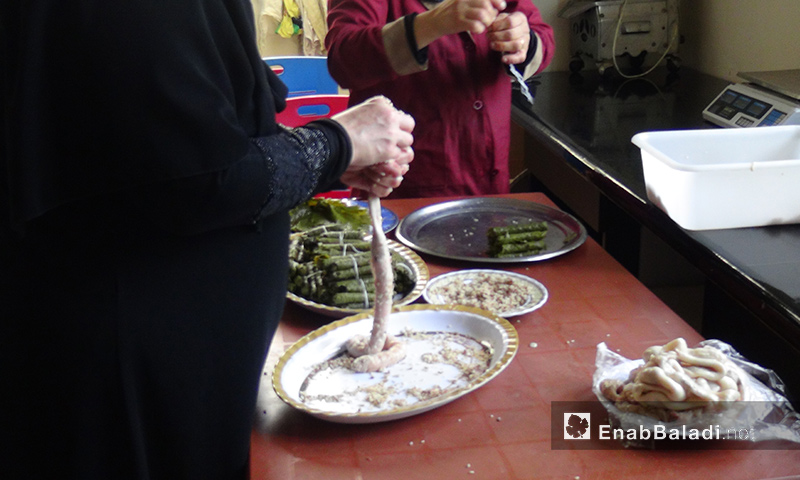She is called “Um al-Ahrar” (the mother of the free people); she cooks meals and sells them to people in Idlib, and with her story she summarizes the reality of Syrian women, who suddenly found themselves in a whirling eddy, with the spin of which they are forced to make a living for their families and bear a responsibility they never thought of prior to war.
Khuloud Tarsha, dubbed “Um al-Ahrar”, thought of turning cooking into a profession in 2015, where she made Iftar meals during the fasting month of Ramadan in the kitchen of her “humble” house. Triggered by her childhood passion for cooking, she sells those meals, the money of which she uses to support her family, consisting of two daughters and a sister who has a physical disability.
Khuloud’s idea crystalized after the success of her Ramadan project, as she decided to open her own kitchen, that serves food seven days a week, preparing traditional Syrian food and preserves. She, then, started marketing for her kitchen, resorting to paper ads and posters, a campaign that ended with an official opening early this year. The kitchen is in her very same house.
Kuloud tells Enab Baladi that she started with simple tools and resources, which covered the expenses of raw materials and gave her a little amount of revenues. But today, very known in the city of Idlib, she is achieving financial gains that provide her a “decent living”, as she describs it.
Today “Um al-Harar” has her own staff of women cooks who help her prepare the meals, pointing out that they are displaced to Idlib and belong to a segment of people “who are truly in need for work”.
“Um al-Harar’s” menu lists various oriental dishes that Idlib governorate is famous for, on top of which is “Mahashi”, different types of stuffed vegetables, cabbage and grape leaves, in addition to different “Mansaf” recipes (Kbsaha, Freekeh, Mandi), as well as different types of “Kibbeh”, “pastry” and a few western dishes.
Concerning the prices, Khuloud, 44 years old, said that they are “appropriate” compared to the high costs of living in Idlib. For example, a chicken meal with nuts is sold for 550 Syrian pounds (about 1.25 dollars), enough for five people, but a meat Kbsaha meal is sold for 900 Syrian pounds (equivalent to two dollars), it is sufficient for the same number of people.
“Um al-Harar” prepares meals based on the customers’ request, in addition to a cooking program that is distributed around the week, as she assigns certain meals to each of the week’s days, advertising them through social media groups, created for her kitchen, especially on “WhatsApp”.
She says that her meals are distinct for being “homemade” and differ a lot from the restaurants’ served food, adding that “cooking helped me generate a monthly income and enhanced my social activity.”
Khuloud has two married daughters, living in Atmeh town at the Syrian-Turkish borders; she raised them alone after she separated from her husband 20 years ago.
Khuloud’s account resembles in its essence the stories of many Syrian women, who chose to start home-based small projects, with which they can have the power to combat war repercussions, on top of which is the absence of the male figure, let him be dead, disappeared or detained.

